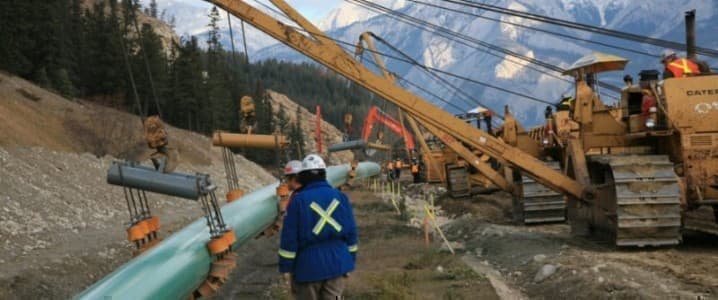A major insurance company dropped coverage for the Trans Mountain expansion project, an oil pipeline seen as vital to the growth of Canada’s oil sands. Under pressure from environmental groups and growing global concerns about climate change, insurance companies are beginning to drop coverage for large-scale energy infrastructure. Swiss insurance company Zurich announced on Wednesday its decision not to renew coverage for the Trans Mountain expansion, a pipeline that was effectively nationalized by the Canadian government for C$4.5 billion. Kinder Morgan, the previous owner, had planned on scrapping the project altogether due to legal uncertainty, rising costs and protests from First Nations and environmental groups. The government of Prime Minister Justin Trudeau bought the project in 2018, allowing Kinder Morgan to exit, and he vowed to build the pipeline.
The Trans Mountain pipeline just prevailed in a major Canadian Supreme Court case a few weeks ago. Ruling in favor of the project, the court dismissed legal battles brought by First Nations in British Columbia. If built, the expansion would triple the exiting line’s capacity to 890,000 barrels per day.
Despite the court victory, the pipeline now faces new obstacles with insurance companies backing out. Zurich was the project’s largest insurer, providing $508 million in insurance coverage, but the policy expires at the end of August. The Swiss company said it would not renew. That may put pressure on other insurance companies backing the project, including Lloyd’s of London, Liberty Mutual, Munich Re and Chubb.
In the short run, shuttered production due to the pandemic has some Canadian pipelines less than full. The downturn has hit the Canadian oil patch hard. It wasn’t too long ago that the government of Alberta, flush with production and not enough pipeline outlets, was tinkering with production cuts. This year, the market has forced 1 million barrels per day offline, with the production trickling back online only now.
But beyond the immediate crisis, Canada sees the Trans Mountain expansion as critical to the industry’s growth. That is particularly true with Keystone XL back on death’s door. The Trans Mountain expansion is “critical infrastructure needed to move Canadian energy to world markets and help restore investor confidence in Canada’s economy and political system,” the Canadian Association of Petroleum Producers says, and its completion is “in the national interest.”
Related: Is Nuclear Energy Making A Pandemic Comeback?
However, the investment case – beyond the immediate construction – looks riskier than ever. “The Canadian government’s stakes in Keystone XL and Trans Mountain could well prove to be a drain on the public purse,” Carbon Tracker said in a report published on Thursday.
With structurally lower oil demand in the medium and long-term, high-cost production will be the most likely assets to be left in the ground. As a result, “no new oil sands are needed,” Carbon Tracker said. New oil sands are immensely expensive, even though they operate steadily for decades, unlike unconventional shale production, for example.
The conclusion that oil sands won’t be needed was based strictly on a cost of production basis, Carbon Tracker added. Because of that, new pipelines – including Trans Mountain – are “surplus” to long-term oil demand levels as the world seeks to comply with the Paris Climate Agreement.
In the long run, Canadian oil supply could peak at 4.9 million barrels per day including diluents, an estimate that Carbon Tracker admits is generous. Meanwhile, combined pipeline, rail and local refining capacity will peak at 5.8 mb/d. Assuming a 90 percent utilization rate for those facilities, Canada would have 5.3 mb/d of takeaway capacity by 2027. Keystone XL and Trans Mountain are not factored into that, and given that takeaway capacity exceeds production, they would be surplus and unneeded.
It is unclear if insurance companies such as Zurich are eyeing these long-term trends, or if they are more concerned with the public relations black eye that they would receive by continuing to back the pipeline expansion.
A spokesperson for the project told Reuters that the project will continue. “There remains adequate capacity in the market to meet Trans Mountain’s insurance needs and our renewal,” the spokeswoman told Reuters in an emailed statement.
By Nick Cunningham of Oilprice.com
More Top Reads From Oilprice.com:








































